08.29.2013 | 7:50 am
As a Very Serious Athlete, you are no doubt approached, from time to time, by other Very Serious Athletes, each with a Lucrative Offer in hand. Their objective: to persuade you to join their cycling team, thus improving their chances at winning local cycling contests.
Of course, you must hear your suitors out. It is the polite thing to do, and cyclists — as you know — are unfailingly polite. But you must listen with a critical ear, because joining a cycling team is a very serious commitment, one which will require you to spend hours riding in a pace line with your teammates. One which will require you to spend your weekends at races. One which will mean that you must sometimes set aside your personal goals in a race to help the team.
One which will mean you will have to wear a jersey so poorly designed that your face will burn with shame each time you put it on.
You must ask yourself whether you are willing to make these sacrifices. But even more importantly, you must ask the team captain if they would mind changing the team name.
Because — and I can say this with utmost certainty — their current team name sucks.
Bad.
I know, I know. It’s not easy to inform a team, before you are even one of them, that they have a ridiculously embarrassing team name. But — and you must trust me on this, because I am approached by cycling teams thrice daily, each begging me to be a part of their team – you need to tell them anyway. They will respect you for your candor, and probably make you team captain or give you a medal or heft you upon their shoulders and parade you around the team bus.
You wouldn’t believe how many times I have been paraded around team buses atop my teammates’ shoulders. “Careful not to drop me!” I always say, half-jokingly, but with just enough seriousness that they know that I regard them as clumsy oafs who might do just that.
How to Name a Team
Once you have graciously acquiesced to be on a team and have had your agent and attorneys make it clear that a team name of your choosing is a condition of your joining said team, you are confronted by a Very Important Decision.
You must now name the team.
Yes, you must name the team. You and you alone. Do not put it to a vote, because you are the only one with the wisdom and perspicacity to name this team correctly. Consider, after all, your team’s former name. Your teammates came up (and apparently were satisfied) with that, so clearly they cannot be trusted, nor even consulted.
Thus, you must shoulder this responsibility alone. But don’t despair, because I will help you with the following Very Good Ideas for Team Names.
Idea 1. Your Own Name
It’s very common and completely acceptable to name a band after a person. Just ask Dave Matthews. Or Barry Manilow. Or One Direction (not many people know that “One Direction” is the actual birth name of the lead singer of One Direction).
If it’s good enough for rock and roll, it’s good enough for cycling.
Also, this is a good idea because people will know who the star of your team is.
Alternatively, you can give your team a name of a completely different — perhaps even a fictional — person. Why, after all, should a cycling team not have a human name? Is it, after all, not made of humans?
I recommend the name “Steve.” Not “Team Steve.” Just “Steve.” It’s a good, general-purpose name.
People will ask you why you named your team “Steve.” Your only response should be a blank stare. Practice this stare until you are very good at it.
Idea 2. One Letter
Letters are easy to type, and difficult to misspell. And — when used properly — they sound somewhat threatening, which is good. However, only a few letters work as team names. These letters follow:
You may think that I have erred in not presenting the letters X and Z in this list. And twenty years ago, you would have been right. Now, however, they are overused to the point of being trite. (Note: Be very careful before choosing “Q” as your team name — it is right on the threshold of overuse.)
Under no circumstance should you name your team with a vowel (in the list above, “Y” is the non-vowel version), nor a letter that is commonly used as a grade in school.
Except “B.” You could use “B” I guess.
Idea 3. Black Dolphin
Black Dolphin is the name of the harshest prison in Russia. If I was on ten cycling teams, I would want all of them to be called Black Dolphin.
Also, if I were in a rock band, I would name it Black Dolphin.
And if I were writing a screenplay about a Tough Ex-Military Hard Case With An Axe To Grind But Also With A Heart of Gold, I would name the screenplay “Black Dolphin.” And I would have the opening scene be about her — yes, her, because I am a modern and progressive screenwriter — being incarcerated in Black Dolphin and vowing to escape so that she could rejoin her cycling team. And the rest of the movie pretty much writes itself. Or at least I hope it does, because I can’t imagine how else it will get written.
Idea 4. Large Company Names
You can intimidate other teams and make them think you have the backing of large and important companies, simply by naming your racing team after them. Some examples:
- Team IBM
- Team McDonalds
- Team Hormel Foods, Tinned Meat Products Division
- Team Supreme Court
The awesome thing about doing this is the companies after which the cycling teams are named often hear about these aforementioned cycling teams and decide to sponsor them after all, because — and I’m quoting (myself) here — “we like your moxie.”
Also, they never send cease an desist letters, because most large companies have a really good, self-deprecatory sense of humor.
Idea 5. Movie Names
A really funny way to name your team is with a play on a movie title or other pop-culture reference. For example, if you are in a relay team for a triathalong and two of you are getting on in years and one of you isn’t and all three of you are male, you could call your team “Two and a Half Grumpy Old Men.”
No, I’m just kidding. Pop-culture references as team names are horrible.
Idea 6. Political Statements
One thing most people don’t realize is that you can use your cycling team name to make a political statement, and that if you do, it will probably influence a lot of people and change their minds toward your way of thinking.
To prove this, I am going to name the next team I join “NObama 2016!!!”
And just you wait and see if he gets re-elected.
Idea 7. Lots of the Letter K
Did you know that if you take any word with a “c” in it and replace the “c” with a “K,” that the word automatically becomes clever and precious?
Or should I say “klever and prekious?”
Well, it’s true. So if you’re looking for a team name that’s very adorable, be certain to choose any pair of words that have “c’s” in them, and replace those “c’s” with “k’s.”
Note: This effect is intensified if you make the “k’s” backward.
Idea 8. Two Random Words
The fact that you’ve read this far without having come to a satisfactory solution demonstrates that you are a Tough Customer Indeed. And so I will now provide you the very best method for naming your cycling team:
Use two random words.
And it’s not like you even have to pick them out of a hat or anything. Just go to a Two Random Word Generator page on the internet (yes, it actually exists).
And there’s your team name. Unless you don’t like it, in which case you should just refresh the page.
If you don’t come up with a team name you love within five tries, you’re being fussy and your team is probably not worth naming anyway.
I have found the following team names, each of which is brilliant, within the last three minutes:
- Team Injury Ingredient
- Team Desk Hamburger
- Team Shoelace Ravioli
- Team Prize Planet
- Team Insulting Cousin
Or, finally, you could just call your team “Team Fatty.”
If you don’t mind hearing from my lawyers, I mean.
Comments (81)
08.27.2013 | 9:00 am
Dear Practically Everyone I Ask About How Your Recent Race Went,
Hey. How’s it going? Good? Good. I’m glad to hear you’re good.
It’s good when things are good.
Now we need to talk. Yes, I know it sounds serious when I say that. That’s because I only say that when I’m serious.
This is a serious thing.
First of all, I want you to know that I am telling you this in friendship. If I didn’t care about you, I wouldn’t even bother. I’d just roll my eyes and let it go. You’ve seen me roll my eyes. But I don’t want to roll them at you. So I’m just going to lay it all out there.
Here goes.
When I ask you, “How’d your race go?” and you answer, “Fine” or “Not bad,” or “I survived,” I want to choke you. To death.
I know. That sounds harsh. But actually I was showing self restraint, because I left out the part where first I punch you in the throat an then spin-kick you so hard you actually travel back in time a little bit.
(Yes, my spin kick really is that powerful. Surely you’ve noticed my quads?)
Now that I’ve explained what I want to do, let me explain why.
When you race, you’re being handed one of life’s little gifts: a custom-packaged story, complete with a cast of characters, a location, a beginning, a crisis, a protagonist, an antagonist (or many!), a resolution, and a conclusion.
You trained for it. You strategized. You probably traveled. And in short, this thing was important to you. So you don’t just have a story to tell, but you have a personal story to tell about an event that was important to you.
So don’t you go acting all self-deprecating, saying something perfunctory and useless like “I had a fun time.” Or “It was a valuable experience.”
We both know that fun had nothing to do with it. Furthermore, even if you were somehow the first person in the history of the world to think “Wheeeeeee, this is fun!” during a bike race — seriously, I can’t even comprehend even the possibility of anyone considering forming such a ridiculous thought during a race — we both know that this isn’t the information I’m after.
I want to know what your finish time was, or how you placed, first and foremost. We both know that. Everyone knows that. That’s what everyone wants to know when they ask how your race went. But rather than just come out and say it, you’re giving me a dose of false humility by revealing pretty much the opposite of what I asked for, as if you came to this race from some kind of higher plane, some magical parallel universe where people race in order to reach a state of peace and joy, and not to beat their chests and throw leaves in the air while yelling in triumph or rage at the top of their lungs.
So let us agree, from here on out, that when I ask you how your race went, you will answer with one of (or a variation thereof) the following:
- “I finished in Xth place in my age group.”
- “I finished in X:YY.
- “I totally kicked butt.”
- “I totally got my butt kicked.”
Are we clear on that? Good. That wasn’t so hard, was it?
Then, once you’ve given me the bottom line — the honest bottom line, not some opaque and meaningless platitude designed to make me ask you the same question again but with greater precision because you’re otherwise too darned humble to tell me a story — you’re all set to tell me tell me the story we both know you’re dying to tell me anyway.
We’ll get to the same place. The difference is you won’t make me drag it out of you, and you won’t be in danger of having your larynx crushed.
So.
How’d your race go last weekend?
Kind Regards,

Fatty
Comments (82)
08.26.2013 | 12:49 pm
Prologue
This story has its beginnings just over three weeks ago. The Swimmer — whom many of you will remember from The Turkey Tri and last year’s Utah Half Race Report – had accompanied a friend on a long training run. A thirteen mile training run. And in spite of the fact that she had not been doing anything longer than short runs up to that point, she had finished it just fine.
And so she had an idea.
The Swimmer called The Hammer and asked, in a concerned voice, “Do you think Elden will feel bad if, instead of doing the Utah Half as part of a relay, I do it on my own?”
I thought about it. Would I be intrigued at the thought of her doing an endurance race when she had essentially no training in the two longest parts of a three-part race? I sure would. Would I be amazed at her tenacity if she could pull it off? I sure would.
Would I feel bad? No way.
And as for The Hammer, she was overjoyed at not having to do the run. With all the emphasis she’s had to put on bike racing this summer, she hasn’t been running much at all, and was not looking forward to racing a half-marathon.
“But before we sign you up,” The Hammer said, “Let’s see how you feel after going on a 50-mile bike ride, followed by a six-mile run.”
The Training
You see, up to this point, The Swimmer had never been on a bike ride of longer than 20 miles. But she was happy to give it a try.
And she did awesome. By the time she finished the fifty miles she was pretty cooked, but she did it. And then she did a six mile run-walk with The Hammer.
“OK, it looks like this is for real,” we said, and we signed her up.
That, by the way, was pretty much the end of her training. She did another 30-mile ride, and a couple short runs, but three weeks doesn’t give you a ton of time to build up your endurance base.
The Dream Team
Meanwhile, I had an idea.
“You have a friend who’s a really fast swimmer,” I said, “and another who’s a wicked-fast runner. All of you are in your forties. Why don’t the three of you put together an all-women, 40+ relay team that will almost certainly take the overall relay division, including beating all the men’s teams?”
The Hammer liked that idea, but her friends had other stuff going on that weekend already. Plus she was really excited to support and watch The Swimmer in her race.
“OK,” I said. “Do you mind if I get together a couple of guys and field a relay team?”
Nope, she didn’t mind.
So I called my friend Bry — who has qualified for and raced the Kona Ironman — and asked him if he’d like to go for a little swim. He was in.
“And do you have any ideas for a fast guy for a run?” I asked.
“There’s a kid — Vic Johnson — who works for me. He can pull consistent six-minute miles for the whole run.”
I started laughing. And laughing. I couldn’t help it.
“Since two of us (Bry and me) average out to about 50 years old, and the other of us (Vic) is a college kid, let’s call ourselves ‘Two and a Half Grumpy Old Men,’” I said.
We had our team.
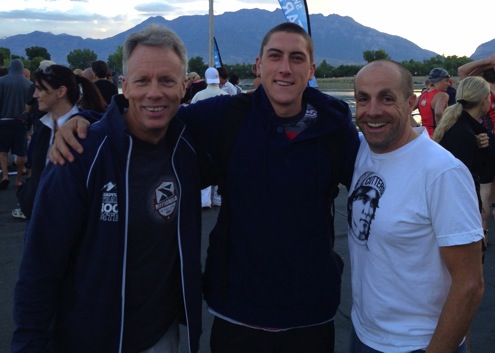
Left to right: Bry, Vic, Fatty, the morning before the race.
The Swim
We got to the Utah Lake marina — from which all three legs of the race would start — at about 6:30. We formed a very carefully-thought-out team strategy: Everyone go at their absolute, utter limit. We knew that if we each had an incredible day, we had a shot at finishing in under four hours.
Meanwhile, The Hammer was having a blast, fussing over and prepping The Swimmer for her race.
Here, The Hammer is making sure every square inch of The Swimmer’s skin is covered in BodyGlide.
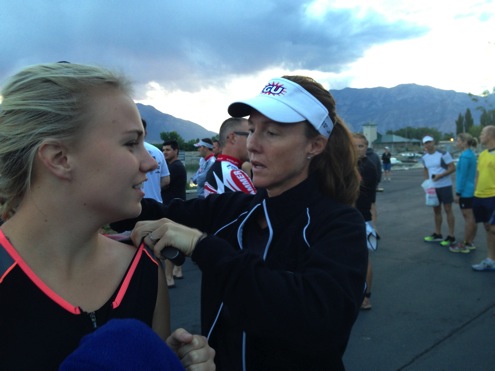
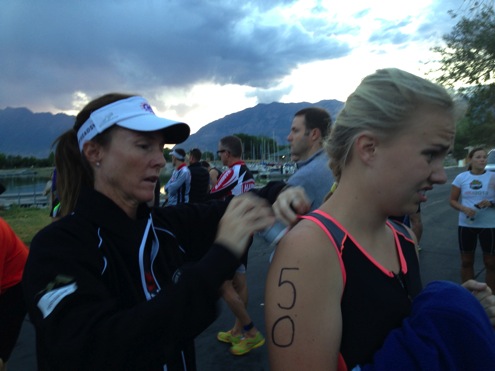
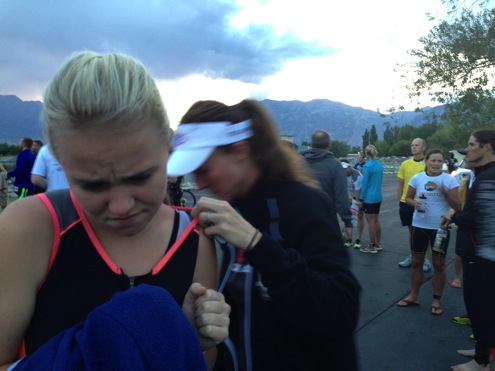
As you can see, The Swimmer was really enjoying herself.
Then she was ready to go:
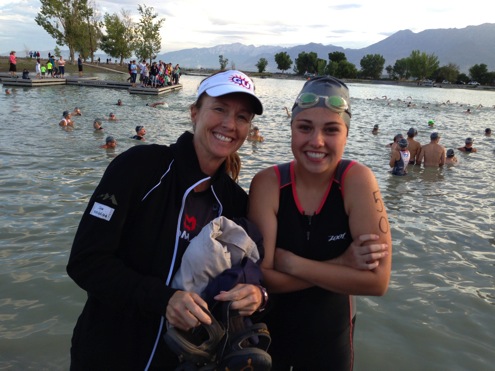
The waves for the beginning of the swim started. Since The Swimmer was a woman under the age of 34, though, she had a twelve minute wait before she took off.
Then we had another four minute wait ’til Bry went — relays were the final wave to leave before the non-competitive wetsuit wave left.
Which meant that my team didn’t start until sixteen minutes after the pros and elites. Which suited me just fine, because that meant I was almost guaranteed to not run out of carrots.
After Bry’s wave started, I found an outhouse, pooped, and changed into my riding clothes, then hung around in the transition area near my seventeen year old boy, who had gotten up early to come to the race and provide moral support to both The Swimmer and me.

He loves being photographed. Obviously.
If there was ever any question about whether 2.5 Grumpy Old Men was taking this race seriously, it ended as Bry came charging out of the water at an absolute dead sprint.
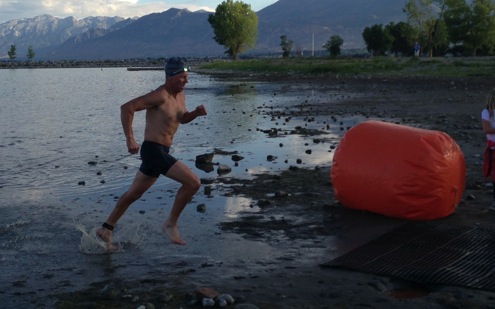
Bry had just done the 1.4-mile swim (longer than the 1.2 it was supposed to be) in 34:24 — making him the fourth-fastest swimmer overall in the race; the only three people who were faster than Bry were all men in the Pro / Elite category.
Our secret plan — of winning not just the relay category, but of having the fastest overall time of the day — was looking downright possible.
Bry sprinted the entirety of the longish run back to the transition area, then stopped, doubled over, while Vic moved the timing chip from Bry’s ankle over to mine.
Looking at me — and I’m incredibly grateful there are no pictures of me here — you could see that I was absolutely happy to sacrifice personal dignity for speed. I had my Shiv set up with water in the in-frame fuelselage (no water bottles to give me increased drag), a skinsuit and time trial helmet on, and my legs and arms — yes, arms — freshly shaven.
But we’ll get back to me in a minute.
Just a few minutes after Bry came charging in, The Swimmer came running in, having just given a serious demonstration as to how she got her nickname: This seventeen-year-old girl had just clocked the fourth-fastest time in the swim of any woman in the race. Yes, including all women in the Pro / Elite category.
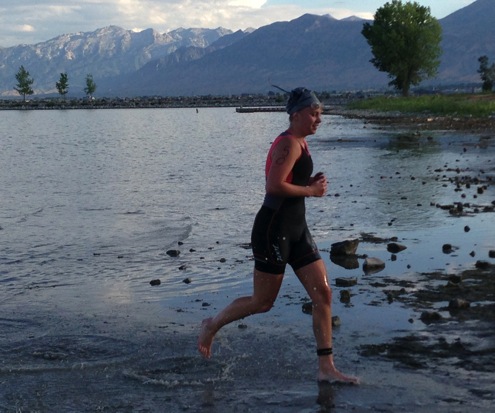
The Swimmer made a quick transition and headed out on what would be the longest ride of her life (remember, she had only ridden 50 miles once before, and this is a 56-mile course).
The Ride
In 2012, I had done this ride in 2:19:47. This year, I hoped to do considerably better.
And so I kept in mind how hard Bry had gone, taking this race seriously. And I kept my effort right on the threshold of blowing up. I know where that point is; I can feel it happening when it starts. And I’ve learned how to back off just enough that I don’t crack, then hold that speed for a few seconds, and then start ramping up again.
And I started passing people.
I’d see someone, and I’d reel them in, and then I’d be past them. Sometimes I’d say, “Hey.” Mostly not though. I just wanted to attack, catch, and demolish anyone I could see.
I didn’t think in words very often. But I do remember thinking to myself, “This is what bloodlust must feel like.”
I was hurting so bad, but I wanted it to hurt even more. I hated it and loved it.
A full-on total-effort TT is a beautiful, purifying experience. (Or at least, that’s how I remember it now.)
Before I got even halfway to the turnaround of this out-and-back course, I had stopped seeing people in front of me very often.
Then I saw the first racer come by me in the opposite direction. I started counting as I got to the turnaround point.
I got to twelve, which dropped to ten within a minute of the turnaround.
And then nine, and then eight.
With twenty-two miles left to go, I was in a non-adjusted ninth place. And I knew that every single one of those eight people ahead of me had at least a ten-minute head start on me.
I looked up and saw The Swimmer. I got a huge smile, feeling so happy that she was doing so well. She was almost to the turnaround.
I caught one more. I had moved us to what was — worst-case scenario — eighth place.
I focused on the road, watching it carefully. The road was in terrible condition, with lots of gravel, serious cracks and potholes, and numerous tight corners, many of which were in bad condition.
“This road is going to end someone’s race in a really bad way,” I thought. And I could see I was at least partially right already — I lost count of how many people I had seen on the side of the road, working on flats.
Then I saw something I’m still trying to work out. I saw a racer coming in the opposite direction of me. Just before I got to him, he flipped a U-turn and continued in the direction I was riding. Was he giving up? Cutting off a third of the course and cheating? Not even in the race?
I had no idea. I passed him, failing to read his number, and kept going.
I didn’t see another rider in the final fifteen miles of the ride course. It was just me and the course marshals and the road markings.
I am very pleased to say, by the way, that I did not make a single wrong turn this year. So, yay me!
I rolled into the marina, where I was blocked by a car — stopped — in the middle of the race course. Luckily, there was another road lane open, so I managed to swerve around the car, heard — but didn’t see — The Hammer cheering for me, and then I was in the transition area.
Vic swapped the timing chip anklet onto his ankle, and was gone at what would be a sprint for me, but what for him was his normal running pace.
I had just done my ride in 2:07:28, which means I had averaged 25.1mph for 53.3 miles (which is a few miles too short to be an actual half-iron distance race, but whatever). Eventually, we’d find out that only one person had been faster on the bike that day: Rory Duckworth, with a blisteringly fast time of 2:03:14 — on average, a whole mile per hour faster than me.
Wow.
Endings, Some Happier Than Others
As I walked my bike back to my truck, where I’d change and then go cheer on Vic as he ran by at impossible speeds, The Hammer had some bad news for me.
“The Swimmer just called,” she said. “She’s crashed.”
I immediately thought of all the gravel and potholes and bad road and corners and the fact that The Swimmer has ridden a road bike around five times in her life.
Evidently, The Swimmer had hit a pothole, lost control, and gone down hard on her left side.
“The handlebar is broken and I’m really scraped up,” she said (which makes two handlebars she’s broken in four months, versus the zero I’ve broken in twenty years).
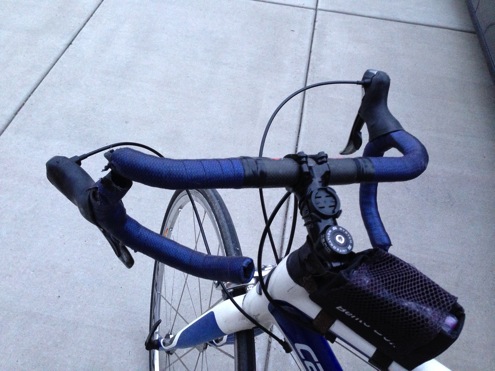
Yup, that’s broken (but The Hammer didn’t realize it was this broken during the call).
“But I still want to finish the race,” The Swimmer said, and the conversation ended there. The Hammer went to wait for The Swimmer at the transition area, and I went to cheer for Vic.
Vic flew by in moments, overtaking people by the dozens.
“I’ll see you at the finish line!” I shouted, and then walked back to the transition area to hang around with The Hammer and wait for The Swimmer to get there and see if she was well enough to finish her race.
But she was already back. The policeman and medic who had been close by when The Swimmer crashed had agreed: her bike was not safe to ride (I agree completely). Also, judging from the state of her helmet, The Swimmer had taken a good hard hit on the head.
And so they had given her a ride back. It doesn’t matter how tough you are (and The Swimmer is clearly just like her mom, toughness-wise); if the officials say you’re out…well, you’re out.
So everyone headed home, leaving me to stick around to watch Vic come in.
I didn’t have to wait long.
Only three people had crossed the line when Vic came charging in, running what I would have called way too fast for him to have just done a marathon. I joined him, thinking we’d cross the line together.
But I couldn’t hang. Nope, not even for fifty feet. By the time he crossed the finish line, Vic was twenty feet ahead of me.
His split was 1:18:54, making him the second-fastest runner of the day. The only person to outrun Vic was BJ Christensen, the overall winner of the individual event. And that was only by 38 seconds.
More importantly, Team 2.5 Grumpy Old Men had just completed this race in 4:01, making us the fastest time not just of the relay division, but of the entire race. With six minutes to spare.
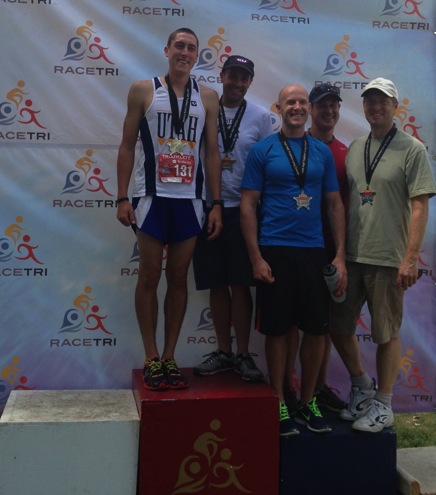
Here we are with the third-place team, Team Darkhorse. Bry had to get home to other stuff, and the second place team didn’t stick around for the awards ceremony.
Not bad. Not bad at all.
Back Home
With the race and awards ceremony out of the way, I came home to see how bad The Swimmer looked.

Ow. That looks bad.
And she’s got road rash pretty much all up and down her left arm, hip, and leg, along with cuts and bruising on the inside of her right leg, from being still clipped in when she went down.
And a very sore neck.
And a concussion.
And so I asked her, not waiting for the memory of the fall to fade, because that’s not my way, “Are you going to try again next year?”
“Of course I am,” she replied.
Which is exactly what I hoped she’d say.
Comments (48)
08.16.2013 | 8:11 am
A Note from Fatty: I will be traveling for work all next week, and won’t have time to write this blog. I’ll be back August 26. ‘Til then, just remember: You’re my very favorite reader of all time.
The Future
I remember Charlie Brown
Talking about post-Christmas letdown
Or maybe it wasn’t Charlie Brown
It could have been someone else
Whatever
It’s beside the point
Anyway
I never really
Understood
What that was all about
Even as a child
When Christmas was over
I was glad
Because Christmas trees make me
Acutely aware
Of my utter lack of artistic ability
Witnessed by
The way my sisters
Would take down the ornaments
I had put up
And put them in new
More artful
Locations
But now
I think I understand
What Charlie Brown
(or whomever)
Was getting at
Because the Leadville 100 is behind me
And the dieting
And the training
And the obsessing
That I poured into this objective
Suddenly seem pointless
I am at loose ends
But lo!
I am just kidding!
Because that race
Is in reality
A somewhat short race
Comparatively speaking
Compared, that is
to the two
– Yes, two –
Much bigger
And longer
And quite frankly
Scarier races
I am planning to do
In the near future
Salt to Saint!
A 420-mile relay
From Salt Lake City
To Saint George
Which I am not
– alas –
Doing as a relay
Instead I shall ride it
Solo
As if to prove a point
On September 20
But I have not revealed all
25 Hours in Frog Hollow!
An extraordinary race
On an extraordinary MTB loop
Near Saint George
Over the time change
Hence the name
Which is somewhat gimmicky
But who am I to judge gimmicks
Because the race is awesome
And I am registered
To race it solo
On a singlespeed
November 2
But I have still not revealed all
Not even close, really
Thank you.
Comments (51)
08.14.2013 | 6:40 am
The Hammer and I went out for a ride yesterday evening. Our first since finishing the Leadville 100 last Saturday. As we rode up Hog Hollow — our gateway to Corner Canyon — The Hammer remarked, “I didn’t have any urge to cry as I crossed the finish line this year.”
“Huh,” I replied, to show that I was listening, but knew that this wasn’t a stand-alone thought (I am able to convey a remarkable amount of information by simply saying “huh.”).
“Not in Twin Lakes, either,” she continued. “Not anywhere during the race.”
I told her I thought this was interesting, and asked if she had thought about why she hadn’t.
“When I first started doing this race,” she said, “I didn’t know if I could finish it. Discovering that I could make myself keep going, no matter what, changed how I saw myself.”
“And now,” I said, understanding, “it’s been quite a while since there’s been any question about whether you’ll finish. You’ve answered that question definitively. In the absence of a busted frame or an act of God, you’re going to finish this race with plenty of time to spare.”
“Yeah,” said The Hammer. “And the question of ‘When will I…’ isn’t as meaningful as ‘Will I at all?’”
I think The Hammer’s right (this is in fact, my default stance on all matters related to The Hammer). You learn more about yourself by completing than by competing. And that makes for a truly meaningful experience. Which is why Doug Bohl’s story — where he literally collapses at the finish — is special. Or why Chris’s story — where (forgive me for the spoiler) he finishes about half an hour too late to get the buckle — is inspiring.
Contrast those finishes with this:
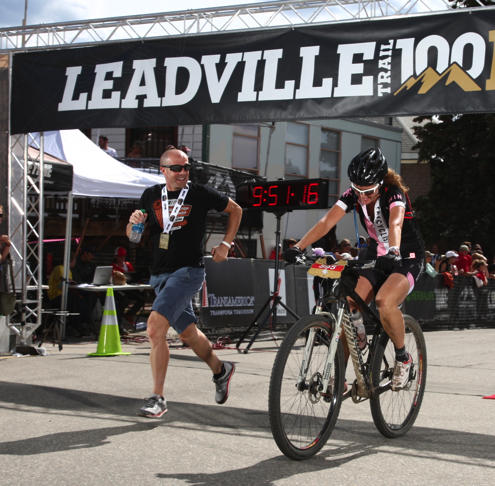
Photo courtesy of Zazoosh Media
That’s The Hammer, crossing the finish line as she’s just set a new women’s singlespeed record at Leadville — by quite a large margin. And that’s me, about an 1.5 hours after I’d finished the race, running the last 50 yards alongside her.
Is it awesome? Yes. Absolutely. Look how happy we are:
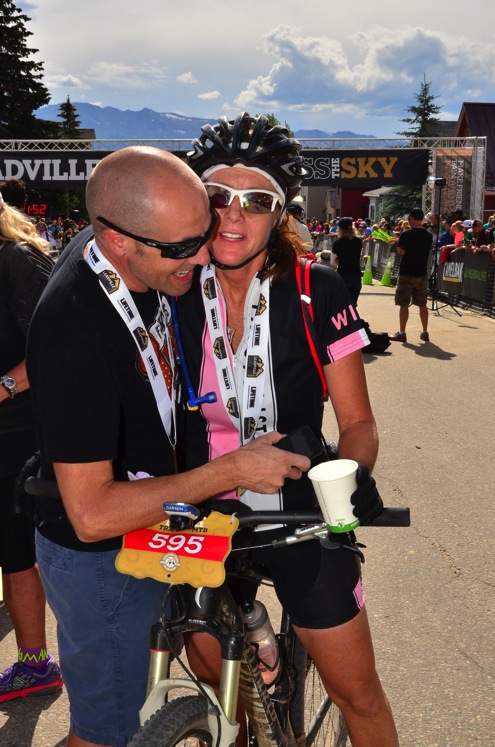
Photo courtesy of Zazoosh Media
But our finishes were more of a confirmation of the value of a lot of years of hard work. A demonstration that you can make significant — albeit incremental — gains if you persist in doing what you love.
If there’s an “aha” moment in that, it’s a lot more subtle than the all-at-once discovery a lot of us have had when we finished our first big race or event…that moment where you discover that the universe of things too hard for you to do is a lot smaller than you thought.
The Obligation of the Experienced
I found myself thinking about the conversation The Hammer and I had. I wondered, for races like Leadville, once you’ve had your breakthrough moment, should you move on? Is there any point in continuing to do the race?
I think the answer’s “yes,” at least for me, for a number of reasons.
First, because I still love doing the race. Not every experience needs to turn your world upside-down. I still feel a huge sense of accomplishment in finishing the race, and I do in fact love that, in my (let’s face it) late forties I am faster and fitter than I have ever been in my life.
This is not the expression of someone who has just phoned in his race:
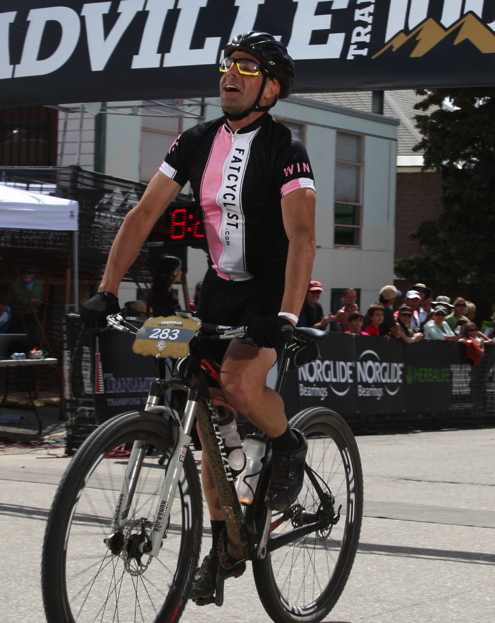
Photo courtesy of Zazoosh Media
But that’s not the only reason. I think that people who have become the old hands are crucial to a race because we become the guardians of that race’s culture.
We’re the ones who know that it’s a tradition for the people who are climbing to the top of the Columbine Mine to cheer for those who are descending. And that it’s the obligation of those descending to encourage those who are pushing their way up.
We’re the ones who know that — even though you’re completely wiped out from your own efforts — the most amazing thing you can do after finishing your race is come to the finish line and scream your heart out for those who are still on the course and are still working just as hard (or harder) than you were.
We’re the ones who know that littering during the race is completely unacceptable.
We’re the ones who know that everyone gets a little bit addle-headed by the altitude and exhaustion and might make a riding mistake, and that everyone’s in this together, and that accidents happen.
We’re the ones who need to pass down the culture of the race by example, and by making sure that everyone we talk with knows that a lot of the best parts of a race don’t have much to do with racing.
At the same time we old-schoolers need to preserve the best aspects of a race, we need to let it evolve without getting cranky about how “it used to be so much better when….” Things change. And if the change is seriously bad, we need to talk to the race organizers — as opposed to spoiling the event for others who don’t have the same frame of reference.
Up Next?
So we’re comfortable with being the old farts sitting in our rocking chairs and acting all grandparently in the Leadville 100 race. Fine.
But we’ve been thinking: we don’t want to just keep doing what we’ve done. We want to see what it would be like to do something different. Something that pushes us outside what I guess we’ll have to call our “comfort zone,” although I wouldn’t go so far as to say that I’m particularly comfortable at any point during the Leadville 100.
We’ve got a couple things in mind. We’ll tell you about them soon.
Once we’ve done them.
Comments (58)
« Previous Entries Next Page »















